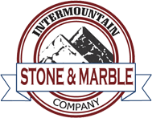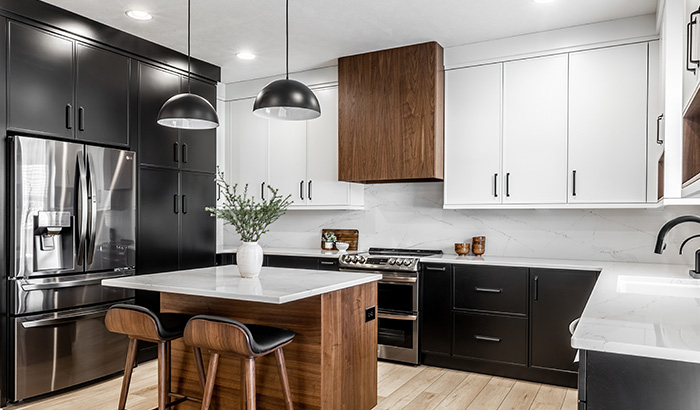Quartz countertops have gained immense popularity in recent years, becoming a top choice for homeowners and designers alike. Understanding quartz countertops’ composition and manufacturing process is crucial to appreciate their durability and suitability for long-term use.
Composition of Quartz Countertops
Quartz countertops are engineered surfaces made primarily from natural quartz crystals, one of the hardest minerals found in the Earth’s crust. The composition typically includes approximately 90-95% quartz, along with resins, pigments, and sometimes additional materials like glass or metallic flecks for aesthetic variation.
This combination of natural quartz and synthetic components creates a highly durable and versatile countertop material. But just how durable are quartz countertops?
Manufacturing Process and Key Characteristics
The manufacturing process of quartz countertops involves mixing the quartz crystals with resins and other additives, followed by compression and curing under intense heat and pressure. This process creates a solid and non-porous surface that exhibits several key characteristics:
- Hardness and Scratch Resistance: Quartz countertops are exceptionally hard, ranking among the top materials in terms of hardness on the Mohs scale. This hardness translates to superior scratch resistance, making them highly resistant to daily wear and tear, accidental knife slips, and other common countertop hazards.
- Heat Resistance: Quartz countertops are engineered to withstand high temperatures without damage or discoloration. While it is still recommended to use trivets or hot pads to protect the surface, quartz can endure moderate heat without warping or cracking.
- Stain Resistance and Non-Porous Nature: The non-porous surface of quartz countertops is one of their standout features. Unlike natural stones like granite or marble, quartz does not require sealing and is highly resistant to stains. Its non-porous nature also prevents the growth of bacteria, making it a hygienic choice for kitchen and bathroom countertops.
- Impact Resistance: Quartz countertops exhibit excellent resistance to impacts, making them less prone to chipping or cracking compared to natural stone alternatives. This resilience ensures that quartz countertops maintain their durability even in high-traffic areas or busy households.
Comparison to Other Popular Countertop Materials
When evaluating the durability of quartz countertops, it’s essential to compare the durability of quartz countertops to other popular countertop materials like granite, marble, and others. While each material has its own unique qualities, quartz stands out in terms of durability.
Compared to granite, quartz countertops offer similar levels of hardness and scratch resistance. However, quartz is non-porous, while granite requires periodic sealing to prevent stains. Quartz countertops also offer a wider range of color options and patterns due to their engineered nature.
In contrast to marble, which is known for its elegance but is more susceptible to staining and scratching, quartz countertops provide a practical and durable alternative. Quartz offers the aesthetic appeal of marble with enhanced durability, making it a sensible choice for homeowners seeking both beauty and long-lasting performance.
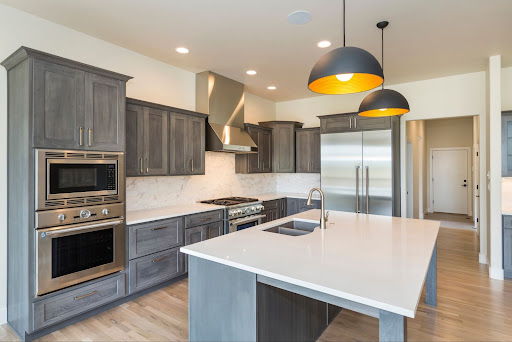
Factors Contributing to Durability
When considering the durability of quartz countertops, several key factors come into play. Understanding these factors will help you appreciate why quartz countertops are known for their longevity and resilience.
Hardness and Resistance to Scratches
One of the primary reasons for the exceptional durability of quartz countertops is their hardness. Quartz, one of the hardest minerals found in nature, gives these countertops remarkable resistance to scratches.
Whether cutting vegetables directly on the surface or accidentally sliding a heavy pot, quartz countertops can withstand a busy kitchen’s daily wear and tear without showing signs of damage.
Heat Resistance and Tolerance to High Temperatures
Quartz countertops are engineered to be highly heat-resistant, making them suitable for use in kitchens and near cooktops.
While it is still recommended to use trivets or hot pads to protect the surface from extreme heat, quartz countertops can endure moderate temperatures without warping or cracking. This means you can confidently place hot pots and pans directly on the surface without damaging them.
Stain Resistance and Non-Porous Nature
The non-porous nature of quartz countertops is a significant advantage regarding durability. Unlike natural stone options such as granite or marble, quartz countertops do not require sealing.
The non-porous surface prevents liquids, oils, and acids from penetrating the material, making it highly resistant to stains. This also means that quartz countertops are easy to clean, as spills can be quickly wiped away without leaving a lasting mark.
Impact Resistance and Resistance to Chipping and Cracking
Quartz countertops exhibit remarkable resistance to impacts, making them less prone to chipping or cracking compared to natural stone alternatives.
Whether accidental knocks, dropped utensils, or heavy objects, quartz can withstand the impact without sacrificing its durability. This quality makes quartz countertops an excellent choice for families with active lifestyles or areas with high foot traffic.
UV Resistance and Color Fading
Another factor contributing to the durability of quartz countertops is their UV resistance. Exposure to sunlight can cause some materials to fade or discolor over time. However, quartz countertops are engineered to resist UV rays, ensuring that their colors remain vibrant and true for many years.
Whether your countertops are near a window or in an outdoor kitchen, you can trust that the quartz surface will maintain its appearance over the long term.
Maintenance and Care Tips
Maintaining the durability of your quartz countertops is essential to ensure they remain in pristine condition for years to come. You can keep your countertops looking their best by following proper cleaning techniques, implementing preventive measures, and addressing common issues.
Cleaning Techniques and Recommended Products
Cleaning quartz countertops is a breeze, thanks to their non-porous surface. Here are some effective cleaning techniques and recommended products to keep in mind:
- Daily Cleaning: For routine cleaning, simply use a mild dish soap or a pH-neutral cleaner mixed with warm water. Wipe the surface with a soft cloth or sponge, then rinse thoroughly and dry with a clean cloth.
- Removing Stubborn Stains: A non-abrasive household cleaner can be used if you encounter stubborn stains, such as dried-on food or beverage spills. Apply the cleaner to the stain, let it sit for a few minutes, and then gently scrub with a soft cloth or non-abrasive sponge. Rinse thoroughly and dry.
- Avoid Harsh Cleaners and Abrasives: It’s important to avoid using harsh chemicals, abrasive cleaners, or scrubbing pads on your quartz countertops. These can potentially damage the surface and diminish its luster. Stick to gentle cleaning agents specifically formulated for quartz surface
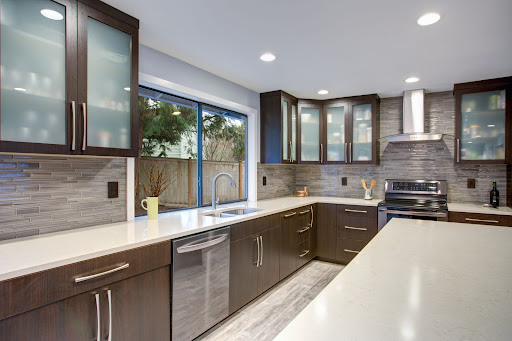
Preventive Measures to Protect the Countertop Surface
Taking preventive measures can significantly contribute to maintaining the durability of your quartz countertops. Here are some tips to protect the surface:
- Use Cutting Boards and Trivets: While quartz countertops are scratch-resistant, it’s advisable to use cutting boards and trivets to prevent unnecessary wear and tear. Avoid directly cutting or placing hot pots and pans on the surface to prevent potential damage.
- Use Coasters and Trays: When serving beverages or placing items like cosmetics, toiletries, or hair products on the countertop, use coasters or trays to prevent liquids or chemicals from coming into direct contact with the surface. This helps to avoid potential staining or damage.
- Clean Spills Promptly: While quartz countertops are stain-resistant, it’s still a good practice to clean up spills promptly. Liquids like coffee, wine, or acidic substances can leave marks if left unattended for an extended period. Wipe spills immediately with a soft cloth or sponge.
Occasionally, you may encounter minor issues with your quartz countertops. Here are some common problems and troubleshooting tips: - Removing Stubborn Residue: If you notice sticky residue or dried-on substances on your countertop, gently scrape it off using a plastic putty knife. Be careful not to scratch the surface. Follow up by cleaning the area with a mild detergent and water solution.
- Addressing Dullness: Quartz countertops may lose some of their natural luster over time due to residue build-up or improper cleaning techniques. To restore their shine, use a quartz-specific polish or a mixture of water and baking soda. Apply the polish or paste gently using a soft cloth and buff the surface.
- Repairing Minor Chips or Cracks: In the rare event of a minor chip or crack, contact a professional quartz countertop installer or repair specialist. They can provide expert advice and perform repairs using appropriate techniques and materials to ensure the durability of your countertops.
How Durable Are Quartz Countertops Compared to Other Countertop Materials
When considering the durability of quartz countertops, it’s essential to compare the durability of quartz countertops to other popular countertop materials. Let’s explore how quartz measures up in terms of durability against granite, marble, solid surface, and laminate countertops.
Granite Countertops: Pros and Cons Compared to Quartz
Granite countertops are known for their natural beauty and durability. Here’s a comparison of granite and quartz countertops.
Pros of Granite Countertops:
- Natural Beauty: Granite offers unique patterns and colors created by nature, giving each countertop a distinctive look.
- High Heat Resistance: Like quartz, granite can withstand high temperatures without being damaged.
- Scratch Resistance: Granite is also relatively scratch-resistant, making it suitable for daily use.
Cons of Granite Countertops:
- Porosity and Sealing: Granite is porous and requires periodic sealing to prevent stains from penetrating the surface.
- Limited Color Choices: While granite offers natural variations, the range of color choices is more limited compared to engineered quartz.
- Maintenance: Granite may require more maintenance, including resealing, to maintain its durability and appearance.
Marble Countertops: Pros and Cons Compared to Quartz
Marble countertops are prized for their elegance and timeless appeal. Let’s compare marble and quartz countertops in terms of durability.
Pros of Marble Countertops:
- Luxurious Appearance: Marble exudes sophistication and adds a touch of elegance to any space.
- Heat Resistance: Similar to quartz, marble can withstand moderate heat without damage.
- Unique Veining: Each marble slab has distinct veining patterns, creating a one-of-a-kind aesthetic.
Cons of Marble Countertops:
- Porosity and Stain Susceptibility: Marble is more porous than quartz and requires sealing to protect against stains.
- Lower Scratch Resistance: Marble is softer than quartz and more prone to scratching, making it less durable in high-traffic areas.
- Acid Sensitivity: Marble is sensitive to acidic substances and can be etched or dulled by common household acids like lemon juice or vinegar.
Solid Surface Countertops: Pros and Cons Compared to Quartz
Solid surface countertops made of acrylic or polyester resin are another popular option. Here’s how they compare to the durability of quartz countertops.
Pros of Solid Surface Countertops:
- Seamless Appearance: Solid surface countertops offer a smooth and seamless look with inconspicuous joints.
- Easy Repairability: Scratches and minor damages can be easily repaired by sanding or buffing the surface.
- Non-Porous: Like quartz, solid surface countertops are non-porous, making them resistant to stains and bacteria.
Cons of Solid Surface Countertops:
- Lower Heat Resistance: Solid surface countertops are less heat-resistant than quartz, requiring trivets or hot pads.
- Moderate Scratch Resistance: While solid surface countertops are relatively scratch-resistant, they may show signs of wear over time.
- Susceptibility to Chemicals: Harsh chemicals can damage the surface of solid surface countertops, requiring caution during cleaning.
Laminate Countertops: Pros and Cons Compared to Quartz
Laminate countertops, made of layers of plastic bonded to particleboard, offer affordability and versatility. Let’s compare them to quartz.
Pros of Laminate Countertops:
- Cost-Effective: Laminate countertops are a budget-friendly option compared to quartz.
- Easy Maintenance: Laminate is easy to clean and does not require sealing or special products.
- Wide Range of Designs: Laminate offers a variety of colors, patterns, and textures to suit different design preferences.
Cons of Laminate Countertops:
- Lower Durability: Laminate is more prone to scratching, chipping, and heat damage compared to quartz.
- Limited Repairability: Unlike quartz, laminate countertops cannot be easily repaired if they become damaged.
- Limited Resale Value: Laminate countertops may not have the same resale value as quartz, which is highly sought after by homebuyers.
While each countertop material has its own unique qualities, quartz countertops stand out in terms of durability, low maintenance, and aesthetic versatility. They offer a durable and long-lasting option that can withstand the demands of everyday use while maintaining their beauty over time.
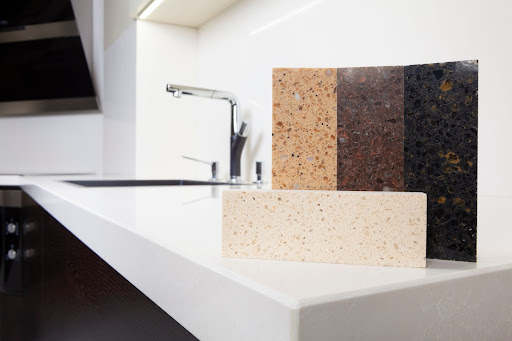
Cost and Value Considerations
When considering countertops for your kitchen or bathroom, it’s important to evaluate the cost and value of your options. Let’s explore the cost factors, long-term savings, and resale value of quartz countertops.
Quartz countertops typically require a higher initial investment compared to some other materials. The exact cost will depend on factors such as the quality of the quartz, the complexity of the installation, and your location. While quartz may have a higher upfront cost than materials like laminate, it’s important to consider its long-term benefits and durability.
The installation cost of quartz countertops also varies depending on factors such as the size of the area, the number of cutouts needed, and any additional customization or edge treatments. Obtaining quotes from multiple reputable installers is advisable to ensure you get the best value for your investment.
Long-Term Cost Savings and Return on Investment
Quartz countertops offer long-term cost savings due to their durability and low maintenance requirements. Here are some ways that quartz countertops can save you money in the long run:
- Durability and Replacement Costs: Quartz’s exceptional durability means it is less likely to incur damage or require frequent repairs or replacements. This can save you money compared to materials that may chip, scratch, or wear out more easily.
- Low Maintenance: Quartz countertops require minimal maintenance, as they do not need sealing or special cleaners. By avoiding the costs associated with regular sealing and maintenance, you can save both time and money over the lifespan of your countertops.
- Stain Resistance: The non-porous nature of quartz makes it highly resistant to stains. This reduces the need for expensive stain removal products or professional cleaning services, resulting in additional cost savings.
- Longevity: Quartz countertops are designed to last many years without losing appeal or functionality. Investing in durable countertops can provide a long-term solution, reducing the need for frequent replacements and associated costs.
Considering these factors, the long-term cost savings associated with quartz countertops can outweigh the higher initial investment, providing a solid return on your investment.
Resale Value and Market Demand for Quartz Countertops
Quartz countertops have gained significant popularity in the housing market due to their durability, aesthetic appeal, and low maintenance. Here’s why quartz countertops contribute to the resale value of your home:
- Modern Appeal: Quartz countertops offer a sleek and contemporary look that aligns with current design trends. Potential buyers often view quartz as an attractive feature and a symbol of a well-maintained, updated space.
- Durability and Desirability: The reputation of quartz for its durability and resistance to stains, scratches, and heat makes it an appealing selling point for potential homebuyers. The assurance of having a durable and low-maintenance countertop material can increase the perceived value of your home.
- Wide Market Appeal: Quartz countertops appeal to a wide range of buyers due to their versatility and availability in various colors and patterns. They can easily complement different design styles and preferences, enhancing the overall market appeal of your home.
While the exact return on investment may vary depending on factors such as location, overall market conditions, and the quality of the installation, quartz countertops are generally considered an investment that adds value to your home.
Sustainability and Environmental Impact
In today’s world, sustainability and environmental consciousness are essential considerations when choosing countertop materials. Let’s delve into the sustainability aspects of quartz countertops, compare them to other materials, and explore recycling and disposal options.
Quartz countertops are engineered stone surfaces that combine natural quartz crystals with resins and pigments. While quartz is a naturally occurring mineral, quartz countertops’ manufacturing process involves some synthetic components. However, quartz countertops have several eco-friendly characteristics:
- Sustainable Sourcing: Quartz is abundant in the Earth’s crust, making it a renewable resource. Responsible quartz countertop manufacturers prioritize sourcing quartz from environmentally responsible mines and promote sustainable mining practices.
- Engineered Efficiency: The production of quartz countertops involves using crushed quartz, which reduces the need for quarrying large stone slabs. This process maximizes using raw materials, minimizing waste and environmental impact.
- Energy Efficiency: Modern quartz countertop manufacturing facilities employ energy-efficient technologies to minimize energy consumption during production. This focus on energy efficiency helps reduce the carbon footprint associated with the manufacturing process.
Comparison to Other Countertop Materials in Terms of Sustainability
When it comes to sustainability, comparing quartz countertops to other popular materials is essential. Here’s how quartz stacks up against alternative countertop options:
- Granite and Marble: Granite and marble are natural stone materials, but their extraction and transportation can have significant environmental impacts. The quarrying process consumes energy and can lead to habitat destruction.
Additionally, the transportation of heavy stone slabs contributes to carbon emissions. In comparison, the manufacturing process of quartz countertops has a lower environmental impact. - Solid Surface and Laminate: Solid surface and laminate countertops are synthetic materials made of petrochemicals and resins. These materials are not biodegradable and can release volatile organic compounds (VOCs) during production and over time.
Quartz countertops, on the other hand, are considered a more eco-friendly alternative due to their composition and lower VOC emissions.
At the end of their life cycle, quartz countertops can be recycled, further contributing to their sustainability. Recycling options for quartz countertops may vary depending on your location and the specific recycling facilities available. - Direct Reuse: If your quartz countertops are still in good condition, consider exploring options for reusing them. They can be repurposed for other projects, such as outdoor surfaces and tabletops, or even donated to charitable organizations.
- Recycling Programs: Some manufacturers or countertop fabricators offer recycling programs for old quartz countertops. These programs collect and process the countertops, extracting the quartz and other recyclable materials for use in new products.
- Professional Removal and Recycling: When it’s time to replace your quartz countertops, consult with your area’s countertop installers or recycling centers. They can provide guidance on responsible removal and recycling options available locally.
By considering the eco-friendliness of quartz countertops, comparing them to other materials, and exploring recycling and disposal options, you can make an informed choice that aligns with your sustainability values.
Quality Quartz Countertops from Intermountain Stone & Marble
Intermountain Stone & Marble Company is your reliable partner in creating the perfect countertop solution for your space. Upgrade your kitchen or bathroom with quartz countertops that will stand the test of time, enhancing your home’s functionality and aesthetics.
Our commitment to craftsmanship and customer satisfaction sets us apart. Explore our wide range of quartz countertop options or contact Intermountain Stone & Marble today and discover the perfect fit for your home.
